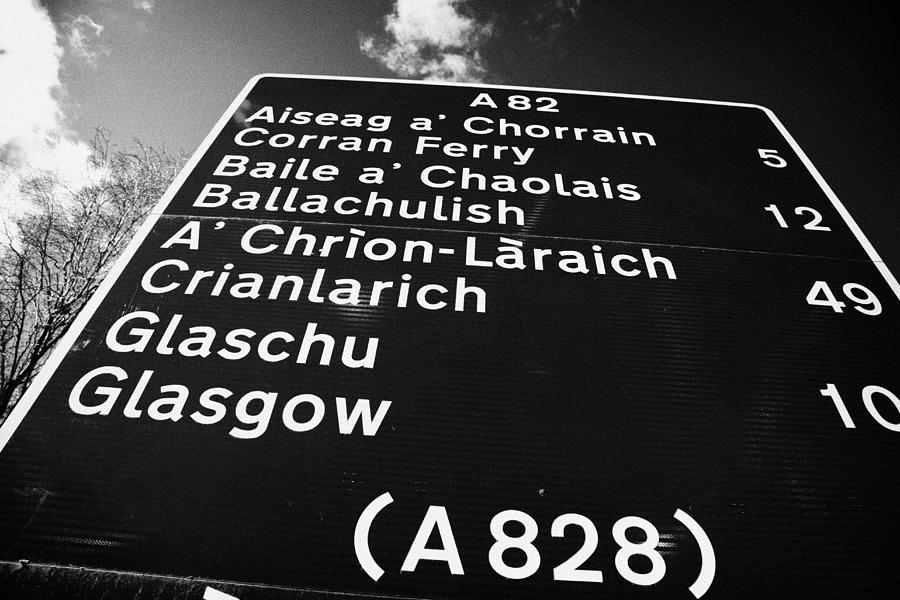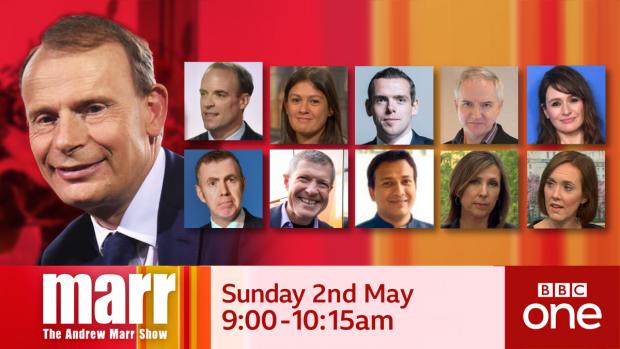On Andrew Marr’s Anti-Gaelic Outburst

The broadcaster and columnist Andrew Marr has hit the headlines with a remarkable outburst against gaelic language signs at the Labour Party conference. Marr’s outburst came as the Scottish Labour leader was asked by an audience member if he would be looking to learn lessons from Labour in Wales’s promotion of the Welsh language.
When Mr Sarwar mentioned Gaelic, Mr Marr cut in, saying: “Perhaps I disagree totally with Anas here, I don’t know.”
“I find it equally offensive that all sorts of parts of Scotland, which have never been Gaelic, have never had Scots spoken…”
There was a loud round of applause from the audience.
Mr Marr continued: “Why does Haymarket station have to have the Gaelic for Haymarket under it? It’s ridiculous.”
“The Scots are made up of many different peoples historically.”
“Many different groups of people have come to Scotland and they brought different languages and I think we should let languages rest and prosper where they come from.”
‘Rest and prosper’ are doing a lot of heavy-lifting here.
As others have since pointed out, bilingual signs have been around since the mid-90s and were first approved by Labour’s Donald Dewar when he was Secretary of State for Scotland. They then flourished under the Labour/LibDem Scottish Executive, whose Gaelic Language (Scotland) Act 2005 expected public bodies to have a Gaelic Language Plan.
Marr has been accused of bias for years. One such accusation was levelled when he decided that in his final series programme before 2021’s historic election it would be a great idea to host an all-unionist line-up.

But Marr is also just completely wrong about Edinburgh.
Gaelic was used in Edinburgh for more than a thousand years when the settlement was incorporated into the Gaelic-speaking kingdom of Alba. Gaelic was the language of political, economic and cultural power in Edinburgh for two centuries or more, and today is spoken by thousands of people. The first gaelic book was published in Edinburgh in 1567 and the first collection of poetry in 1751. The city has been home to writers and scholars like Duncan Ban MacIntyre (1724-1812), Alexander Carmichael (1832-1912), Sorley MacLean (1911-96) among them.
The 2022 Census revealed that Gaelic in Edinburgh is growing. The number of people in Edinburgh who can speak Gaelic rose by 47% between 2011 and 2022 – from 3,157 to 4,628. The number of people with one or more Gaelic skills (speaking, reading, writing, understanding) rose by 84% – from 5,935 to 10,381.
There’s a kind of erasure at the heart of British Unionism that is where Marr’s self-loathing comes from. The logic behind being ‘offended’ by seeing gaelic in Scotland’s capital is ‘you and your culture don’t really exist’. It’s a form of colonialingualism – ‘the privileging of dominant colonial languages, knowledges, and neoliberal values of monocultures.’
Urban gaelic speakers exist and have a right to exist. As Musa Anter, the Kurdish writer assassinated by the Turkish government in 1992 said: “If my mother tongue is shaking the foundations of your state, it probably means that you built your state on my land.”

Multi lingual signs are very welcome. THey make you think.
provided yer not in any rush and require thinking time this might be a truism
How much thinking time do you need to read a sign with two names on it, and the ‘English’ name more prominently?
would you like to debate the spelling of Gaelic placenames with someone not currently employed as a delivery driver in the highlands & islands which tend to git snow covered, slippery & treacherous, not to mention dark as the proverbial underground bunker around 7pm this time ae year only tae git worse & worse still moving into the new year providing one remains in the land of the living
I must say I identify more with the old Scots language.
Well that’s just fine. You do not have to choose between Gaelic and Scots.
And many of the ‘English language’ names are, or are derived from, Gaelic or Scots. Remind me, what is the English name for Airdrie?
Also Scotrail, are a nation wide organisation, so their policy of Gaelic names for stations will affect stations from Gretna to Thurso, and quite rightly so. Gaelic was indeed spoken in every part of Scotland apart from Berwickshire and Roxburghshire, even so their are Gaelic derived place names there: and Gaelic was the language of the first kings of what we call Scotland, and our name Scotland reflects this Gaelic was the language of the people who named our country
Gaelophobes will be delighted by Andrew Mary’s rather ignorant comments.
The Church of Scotland’s Gaelic congregation in Edinburgh celebrated our 250th anniversary in 2019. We’ve been here since before Hearts and Hibs, before the Festivals, before James Gillespie’s High School. We were part of Edinburgh when the Meadows was for gazing livestock. We were part of Edinburgh before Leith was, before New College, Waverly and the Scott Monument had even been thought of. We were here when Murrayfield was just fields.
How much longer do we have to wait until we are a legitimate part of the city? How much longer will it take for people to recognise that we belong here? And if we’re still not accepted as part of it now, after centuries as a community being of the city, what message does that send to our Polish, Punjabi and Romanian neighbours?
Well said
Baith ma laddies went through GME fae P1 tae S6. Ah kin honestly say yons the best decisioun we iver made concerning thir education. As weel as gein thaem the opportunity fur aspects o thir culture tae be kythe tae them, the benefits o haein twa leids cannae be overstatit.
The tuim harns o fowk claught ben an 19th century mindset wid gie ye the grue in the 21st.
Love it. Moran taing.
Why would having Gaelic place names (as well as English) Be a problem for anybody? Unless of course they were denying that Scotland is a country and not just north Britain.
I used to quite like Andrew Marr, no more!
You’re creating mythology… a state that never actually existed. That’s a problem.
I agree with Marr – if you must, use dual signage where Gaelic is commonly spoken, otherwise leave it out. We saw nonsense about Gaelic policy in the northern isles yet nothing of our native (but extinct) Norn – and it is hard enough to get Ordnance Survey to use proper place names there rather than those supplied originally by non-native “literates” like ministers and schoolmasters a couple of centuries ago. Thankfully such policy was never implemented. Scotland has diverse cultures which should be acknowledged but none should be foisted on areas where they do not apply.
the only language that has been ‘foisted’ on speakers of another language has been English on Gaelic speakers; witness the rapid decline of Gaelic and the remaining pockets where it is still the community language. It will probably die out, as your own language of Norn has, it will die out precisely because of the attitude you display, and your in ability to make common cause with speakers of other minority languages.; all of whom were made to feel inadequate, stupid and had it beaten out of them if they were children. Sad that the small concessions Gaelic has won are resented by many, who presumably wish it had died out already.
You Sir, are an elf. Gaelic signage is a small recognition of the Gaelic language’s right to exist, a tiny means of addressing the centuries of discrimination and official policy of extermination of the language that once was prevalent across most of Scotland. I leave the word to Walter Kennedy of Glen Tig, Carrick, South Ayrshire, writing around 1500 in The Flyting of Dumbar and Kennedie:
Thou lufis nane Irische, elf, I understand,
Bot it suld be all trew Scottis mennis lede;
It was the gud langage of this land,
And Scota it causit to multiply and sprede
Have you read the article Robin?
I suppose Embra should be used alongside Edinburgh on street signs in the capital, as myself and who a few of my mates pronounce it that way.
https://weegingerdug.wordpress.com/2018/04/27/gaelic-illiteracy/
wan wundrs what kind of matt he has outside his front door or might it be an old toly
also, I haven’t heard much mention of stirling being capital of scotland mid 16th century prior to edinbroch’s claim
Andrew Marr was privately educated at schools that relied heavily on Edwardian text-books of an imperial persuasion. Quite a lot of that exposure tumbled out in the scripts of his reactionary television history of the world.
To MacGilleRuadh- The quotation from Scots can only be read properly if you have knowledge of the language. A problem you must have yourself quite often. The letter “l” is not pronounced therefore the word is ef becomes if, making your comment hilarious. I do agree with the use of our languages in public places and look forward to someone translating all the Gaelic placenames into Scots. Now there’s a challenge.
Marr has apologised and said his remarks about Gaelic were wrong.
all he has done has given bbc alba their annual advertismint, which is the hail pint ae andra marr